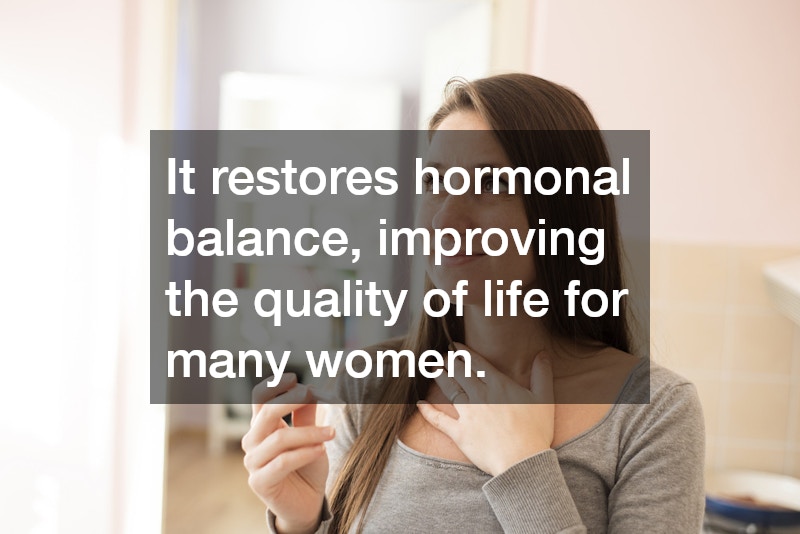
Estrogen replacement therapy (ERT) helps alleviate symptoms of low estrogen levels, such as hot flashes, mood swings, and bone loss, often associated with menopause. It restores hormonal balance, improving the quality of life for many women. When comparing estrogen pellets vs patches, each method has unique advantages. Estrogen pellets, implanted under the skin, offer consistent hormone release over months without the need for daily management. Patches, on the other hand, are applied to the skin and deliver estrogen transdermally, with easy dosing adjustments but requiring regular replacement. Your choice depends on lifestyle preferences and medical advice.

Many women turn to hormone clinics for women to receive personalized care for hormonal imbalances. These clinics specialize in treatments like ERT, tailoring solutions to individual needs through testing and monitoring. Finding experienced hormone therapy doctors ensures you receive safe and effective treatment. These specialists understand the nuances of hormone replacement, helping patients choose the best therapy method while managing potential risks.
For those looking to supplement estrogen naturally, low-estrogen supplements can be a helpful option. These include plant-based phytoestrogens found in soy and flaxseed, or over-the-counter vitamins designed to support hormonal health. However, consulting with a doctor is crucial to ensure proper treatment. Call today to talk to the medical pros to see what option is right for you!

For women around the world, two major arenas of health they face deal with infertility and menopause. Womens health can cover a wider range of topics, but these two particularly common, and with the right treatments and understanding of one’s own body, today’s woman can stay on top of her health and understand what her body needs, and what it is doing. Women looking to get pregnant, or women entering middle age, will often address one or both of these topics in various ways, anything hormone replacement therapy to how to find a gynecologist to finding infertility solutions.
Dealing With Infertility
A major aspect of womens health is reproductive health, and what to do when something seems wrong. A woman facing this sort of health challenge is not alone: it is believed that 11% of couples will experience secondary infertility, meaning that they are unable to conceive a child within 12 months after the first one is born. Sometimes, this is a result of deliberate behavior, such as tobacco use. It has been determined that smoking as few as five cigarettes per day can lower fertility in both men and women, so womens health can often be as simple as cutting back on bad habits. Other times, pursuing womens health means going to a medical professional for tests or examinations after problems present themselves, including infertility.
According to Mayo Clinic, womens health for infertility can take a variety of forms for patients. Imagine tests are one service offered at medical centers, where a pelvic ultrasound is used to search for uterine or fallopian tube disease. A procedure called a hysterosonography will find details in a uterus that a normal ultrasound can’t detect. There are also over the counter options, such as an ovulation prediction kit. With this kit, a woman can check for the surge of luteinizing hormones, or LH, that occur before ovulation, and similarly, a blood test for progesterone can be performed after ovulation. At a medical center, a hysterosalpingography will involve X rays and injected x ray contrast fluids in the uterus to check for abnormalities in the uterine cavity. What is more, this test can check whether the fluid passes through the uterus and spills out of the fallopian tubes. Any found abnormalities can call for new procedures to fix the problem.
Infertility treatment can take several forms, such as drugs clomiphene citrate (stimulates ovulation), or metformin (improves insulin resistance to improve likelihood of ovulation). These drugs and more have potential side effects, and should be noted before use. Some surgical procedures can also fix problems of infertility, such as tubal surgeries to address fluid blocking in the fallopian tubes or other blockages.
About Menopause
Every woman experiences menopause in her life, although the woman’s age at the time of onset can vary. The mean age for menopause is 51, and the typical range is 40-58, but a woman could potentially experience menopause as young as in her 30s, or as late as her 60s. External factors can cause it to happen early, even something as non medical as economic hardship, or something psychological such as ongoing depression. Women experiencing menopause can opt for hormone therapy, a relatively safe treatment that may last up to five years and is not associated with aggravated risk of heart disease. Still, a woman taking this therapy is advised to be screened and possibly treated for other health factors. High blood pressure and breast cancer are two particular side effects to watch out for.
According to Menopause, some of the benefits of systemic hormone treatment may include lessening or preventing vaginal dryness, hot flashes, night sweats, and bone loss. A woman’s age, specific medical history, willingness to take risks with health, and product costs can all effect her decision on whether to take hormone therapy, and if so, what kind. This aspect of womens health is something to discuss with a doctor and other professionals to find the right course of action.